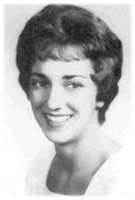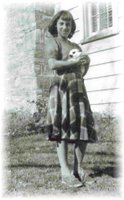 One of the first words we teach to our children is ”Thank You.” When someone does something for them or gives them a gift, we say, “Honey, what do you say? Say Thank you.” "Tell Aunt Mary, ‘Thank you.’…tell Grandmother 'thank you'.” And when they finally say, “Thank You,” in their little baby voice, we hug them and tell them how sweet they are.
One of the first words we teach to our children is ”Thank You.” When someone does something for them or gives them a gift, we say, “Honey, what do you say? Say Thank you.” "Tell Aunt Mary, ‘Thank you.’…tell Grandmother 'thank you'.” And when they finally say, “Thank You,” in their little baby voice, we hug them and tell them how sweet they are.
The season we are in has been called “Hallow-thank-mas". It starts each year before Halloween with increasingly elaborate Halloween decorations and continues through the many festivities of Christmas. Sometimes it seems Thanksgiving get squeezed out.Thanksgiving Day as a Holiday began in the fall of 1621…as the Pilgrim Fathers and Mothers in America were facing their second winter. Half of them had died that first winter. The wheat and the peas they had brought with them failed to germinate. At one point the daily rations were 5 grains of corn.
 When Fall came in 1622, it looked like the few who had survived that dreadful first winter would have enough food and shelter to survive a second winter.They still had problems...they had not reached Utopia. But they were filled with gratitude to God. And that level of gratitude was to carry them a long way.
When Fall came in 1622, it looked like the few who had survived that dreadful first winter would have enough food and shelter to survive a second winter.They still had problems...they had not reached Utopia. But they were filled with gratitude to God. And that level of gratitude was to carry them a long way.
I heard a Presbyterian minister tell about a time when he and a friend took a bicycle tour of Hawaii one Summer. They pedaled up a hill just as a rainbow arched across the horizon and to make it even more awesome it was just as a cooling rain began to fall while the sun was still shining!And in awe, he turned to his friend and said, “Wouldn’t it be wonderful if we could bottle this up and bring it out some dreary November day. The friend replied, ”You need to do what my father taught me. My father told me to “remember my goose bumps.”
This is what the Apostle Paul did. When Paul was an old man, writing from a Philippians jail, chained to guards, he kept remembering and rejoicing, ”In the Lord.”This is what many of us do as in memory we have sunshine even in the storms of life.This is what Moses reminded the children of Israel to do.
The Israelites had been wandering in the desert for 40 years. Finally they are standing on the verge of Jordon and Moses is telling them what kind of people they are to be if they are to keep the freedom God had given them by bringing them out of slavery in Egypt. They were to remember. They were to memorize their history and teach it to their children.We see them standing in the door of the Promised Land recounting their history in a beautiful liturgy. They are reciting, "A homeless Aramean about to perish was our ancestors and we had bad times. We were enslaved ... we were oppressed ... we were afflicted.”“But we have a God! God brought us out of Egypt with an outstretched hand...We are no longer a “no people”...we are God’s people”
Back in the 1950's, when my husband was a student pastor, he had driven to church to preach about 90 miles away. The children and I usually went with him for a week-end stay in a non furnished five room “parsonage with a path”. But that is another story to tell later.That Thanksgiving Sunday in 1952 I was home with a sick baby. I had lost a great deal of sleep and it was a cold and dreary day in a small apartment on a college campus.
A little after eleven, the baby was asleep and I decided to turn on the radio (no TV) while washing the dishes and cleaning up the kitchen.A preacher was in the midst of sermon about things for which to be thankful. He said, “Have you ever thanked God for dirty dishes.” And tired as I was, I thought, “as a matter of fact, I don’t believe I ever have” But another thought followed and I realized …“If one has dirty dishes that means they have eaten ... People with no food do not have dishes to wash.” Have you ever thought that the beggar out on the park bench has no dishes to wash, no floors to mop or furniture to dust?The preacher read a poem written by a teen aged girl. I have never seen the poem in print but remember it as something like this:
“Thank God for the dirty dishes
For they’ve a story to tell
And from the stack I have to wash
We’ve eaten very well.
While folks in other lands,
Are glad for just a crust
From this stack of evidence
God’s mighty good to us.”
Thanking God for the things we usually take for granted is a step in the right direction on Thanksgiving Day and every day. A good place to start is to begin with zero and move up to the level of being grateful for ordinary things of life, food to eat, a clean bed, a warm house, fresh apples, turnips greens and cornbread, the smell of flowers, a Christmas tree, a church. And freedom!
I think I may have gotten a new idea of what Zero is when I saw women in Afghanistan, a few years ago, being thankful for just being able to uncover their faces and men being free to shave or grow a bread as they wish.God has made beauty and not just utility. Food could have all been tasteless and flowers without color or smell. Thank God. I believe it was C.S. Lewis who said “there is a profound democracy in creation…there are some things we all inherit.”
All of us, rich and poor, men and women, have inherited the possibility of knowing God through Jesus Christ who has broken down the wall of separation and offers us life here and life eternal in the next life.Helen Keller, blind and deaf, said, “I thank God for my handicaps. Through them I have found myself, my work, my God.” Whatever it take, find God.
One source of ingratitude is lack of thought! “Think” in the Anglo-Saxon is related to “Thank.” A “thank” is a “thought.” To “think” is to “thank”The Psalmist tells us “Bless the Lord, O my souls and forget not all His benefits,” Forget not…remember. Thoughtful people are thankful people!
 At Trinity Church in Georgia's Rome, a live Nativity Scene has been a Christmas tradition since 1957 when Mary Craven, a Children's Sunday School Teacher, suggested the project to make Christmas a more Christian event for children. Paul Carven, a Trinity member and Rome contractor built the first set.
At Trinity Church in Georgia's Rome, a live Nativity Scene has been a Christmas tradition since 1957 when Mary Craven, a Children's Sunday School Teacher, suggested the project to make Christmas a more Christian event for children. Paul Carven, a Trinity member and Rome contractor built the first set.








 Our beautiful Lynda Joan is the second of our seven children born to my husband and me. Words and/or pictures are inadequate to tell how much each of our children fills my heart to overflow with love and how much
Our beautiful Lynda Joan is the second of our seven children born to my husband and me. Words and/or pictures are inadequate to tell how much each of our children fills my heart to overflow with love and how much











 Soon the military draft was begun. Women were never drafted, but many volunteered to serve in the WACS and WAVES. Able-bodied young men were eager to sign up. It was the right and patriotic thing to do. They felt a desire, a need, and an obligation to protect their families and their country from threat and to insure our way of life.
Soon the military draft was begun. Women were never drafted, but many volunteered to serve in the WACS and WAVES. Able-bodied young men were eager to sign up. It was the right and patriotic thing to do. They felt a desire, a need, and an obligation to protect their families and their country from threat and to insure our way of life. 


 Alas, the last of our exciting Georgia snow melted from a shady spot on my patio a few days ago. Pictured above is my young friend, Raiford Crews playing in the brief 2010 Georgia snow.
Alas, the last of our exciting Georgia snow melted from a shady spot on my patio a few days ago. Pictured above is my young friend, Raiford Crews playing in the brief 2010 Georgia snow.




 In Mama's amazing love and respect for this man, she seemed to think her husband and my father, Benjamin Wilson Baird, had the last word on matters of faith and values.
In Mama's amazing love and respect for this man, she seemed to think her husband and my father, Benjamin Wilson Baird, had the last word on matters of faith and values.



 My father died during the great depression in 1932. When the Japanese attached Pearl harbor in 1941 and President Roosevelt declared war, my mother worked as a weaver in the Osprey Mill in Porterdale Georgia.
My father died during the great depression in 1932. When the Japanese attached Pearl harbor in 1941 and President Roosevelt declared war, my mother worked as a weaver in the Osprey Mill in Porterdale Georgia.







